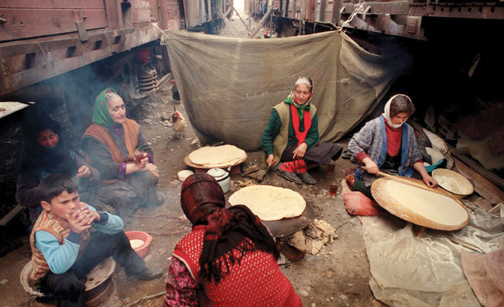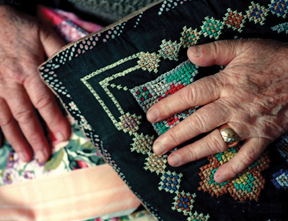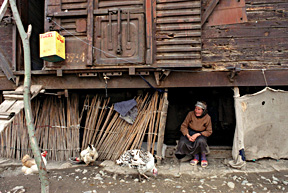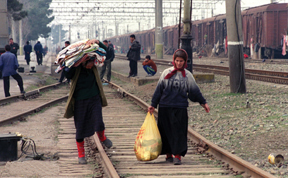|

Spring 2002 (10.1)
Pages
32-35
A Moment's Warmth
In a
Forgotten Land
by Kathy Lally, photography
by Algerina Perna, both of The Baltimore Sun
Reprinted with permission from The Baltimore Sun, December
23, 2001.
Gift From Afar: Caring Shared,
Square by Square - Lisa Pollak
  The little crowd presses close to the
man with the list. He calls out the first name and a frisson
of eagerness, of expectation and even hope roils from one to
another, women wearing layers of mismatched castoffs, men in
tattered caps and suits worn long past respectability, children
in anything that fits. The little crowd presses close to the
man with the list. He calls out the first name and a frisson
of eagerness, of expectation and even hope roils from one to
another, women wearing layers of mismatched castoffs, men in
tattered caps and suits worn long past respectability, children
in anything that fits.
They reach up in desperation and yearning.
The long journey is at an end. Some of the quilts stitched in
Perry Hall by the women of St. Michael Lutheran Church have reached
their destination, 7,000 miles away, in the Muslim country of
Azerbaijan. Shipped from Baltimore along with quilts from other
U.S. churches, trucked to a United Nations warehouse in the capital
of Baku, they have been driven to refugee settlements: in Saatli,
where many of the 50,000 refugees who live in drafty railroad
boxcars are encamped, and to Vagazin, where a few hundred others
live in snake-infested underground holes, and to Agjabedi, where
400 more live in an abandoned hostel with sporadic electricity
and no running water.
The refugees clutch piles of three and four quilts as if they
will bring deliverance. Someone has thought of them, has sent
them something to help, a bit of warmth for the spirit as well
as the flesh.
  Left: Each family uses three boxcars: one as a kitchen;
one as the foyer; and one as a bedroom/living room. Left: Each family uses three boxcars: one as a kitchen;
one as the foyer; and one as a bedroom/living room.
But then the attention
delivered with the quilts is over. The empty truck pulls away.
And once again these are a forgotten people, a virtual city of
forgotten people, 570,000 of them scattered around the country.
Quilts cannot offer a way out of desperation. They cannot suggest
peace with Armenia, or promise a return to the homes and lives
abandoned eight years ago when the war began. They do not bring
the prospect of jobs, or decent clothing for the children, or
any kind of future at all.
"I don't need aid", says Valida Gasimova, a retired
teacher in Agjabedi. "I need my own land back." The
women gather around her, telling of sick husbands and daughters,
of the shame of surviving on handouts when they could work if
only they had jobs, how their teenagers suffer bitterly for lack
of decent clothes, how their small children go without toys.
But they are a sturdy people, and they are as ashamed of complaining
as they are of their circumstances.
"We are refugees," says Gulchohra Taghiyeva, a 45-year-old
former school librarian, "and we are very grateful for everything
you send us.
"We have stopped complaining," she says. "Just
don't pay any attention to that."
They are country women, favoring long dresses or skirts and brightly
colored kerchiefs on their heads. Taghiyeva wears what has been
given to her despite the incongruity - a tracksuit jacket over
a leopard-print dress. She insists that any visitors here must
come to her home for tea, and if they refuse she will be mortified
forever.

Above:
One day in 1993, the freight
trains stopped running through the Azerbaijan town of Saatli
because their destinations had been captured by Armenia in the
war over the Nagorno-Karabakh region. Soon, displaced people
on the run filled up the boxcars that once held animals and grain.
Somehow, they live their lives here, even cooking the large flat
rounds of bread on outdoor fires built between the rails. Children
like Elman Mammadov (left) have no toys and little to do. He
sits as bread is being prepared by (from left) Elmira Guliyeva,
Filyar Mammadguliyeva and Kamala Mammadguliyeva.
  Left: The talented hands of 70-year-old Afarin Abdullayeva
have produced rugs and quilts and needlepoint and embroidery.
On this day, they clutch a gift (left), a patchwork quilt from
Maryland, and some of her own work (right). Left: The talented hands of 70-year-old Afarin Abdullayeva
have produced rugs and quilts and needlepoint and embroidery.
On this day, they clutch a gift (left), a patchwork quilt from
Maryland, and some of her own work (right).
She leads her new American
friends to the five-story hostel, where the hallways are long
and very dark, and children emerge from the apartments like rabbits
bounding out of a cramped hutch. Her family of six lives in two
rooms. Often, they go for three days without water, which they
haul from a tap outside the building when it's running.
Taghiyeva walks to a nearby river to wash clothes; she cooks
on a hotplate and bakes bread in an outdoor oven. A group of
families built an outhouse, their only convenience.
Though Taghiyeva's two rooms are damp and dark, treasures lie
inside. At the expense of medicine for her husband and clothes
for herself, she has sewn a dowry for her 22-year-old daughter:
more than a dozen thick quilts.
"I'm proudest of these," she says, lovingly stroking
two in red velveteen and another in green. "I sew with my
daughters. It's our tradition. All the things we were preparing
for my son, we left behind. We were building him a house, so
he could marry. That's gone. But I have a dowry for my daughter."
  Eight more dowry quilts are airing outside,
waving on a clothesline like sunny flags of defiance, testament
to Gulchohra Taghiyeva's refusal to surrender to circumstances. Eight more dowry quilts are airing outside,
waving on a clothesline like sunny flags of defiance, testament
to Gulchohra Taghiyeva's refusal to surrender to circumstances.
These rural people cherish their bedding. When they fled their
homes, it was their quilts they gathered up as they ran.
Right: A refugee woman sits under an abandoned
boxcar, the only place the refugees in Saatli can now call home.
In the countryside of Azerbaijan, a woman's reputation could
stand or fall on the plumpness of her pillows and the elegance
of her quilts, and her handwork provided a rich vein of conversation
for neighbors and relatives to mine.
At night, pallets were put out on the living room floor for sleeping.
Mornings, they were folded up with the colorful quilts, stacked
in the living room under a crown of pillows and covered with
a veil of white lace, a still life ready for any neighbor's appraising
gaze.
  Left: Once Filyar Mammadguliyeva, 32, (left) and Kamala
Mammadguliyeva, 25, had little stone houses surrounded by trees.
War destroyed it all. Now they walk along railroad ties instead
of garden paths. They are carrying quilts, made by Lutheran women
in America and distributed here by the United Nations High Commissioner
for Refugees. Though the women all pride themselves on their
own beautifully handmade quilts, the arrival of the gifts connects
them, for a moment, to the wider world, which otherwise ignores
them and their desperate desire to return home. Left: Once Filyar Mammadguliyeva, 32, (left) and Kamala
Mammadguliyeva, 25, had little stone houses surrounded by trees.
War destroyed it all. Now they walk along railroad ties instead
of garden paths. They are carrying quilts, made by Lutheran women
in America and distributed here by the United Nations High Commissioner
for Refugees. Though the women all pride themselves on their
own beautifully handmade quilts, the arrival of the gifts connects
them, for a moment, to the wider world, which otherwise ignores
them and their desperate desire to return home.
The wool in the pallets
and quilts and the down in the pillows came from the sheep and
geese the women tended, and a fat pillow was evidence of her
talent and hard work.
They have clung to their quilts as if even one small thread from
their pasts will bind them together, protect them and preserve
the promise of their return home.
We love beautiful quilts and pillows," Taghiyeva says.
Kind hands in far-off Maryland have sent quilts here. Capable
hands made idle and desperate have received them.
But the hands here remain outstretched, awaiting something more
than hope.
____
Back to Index
AI 10.1 (Spring 2002)
AI Home
| Magazine
Choice
| Topics
| AI Store | Contact us
Other Web sites
created by Azerbaijan International
AZgallery.org | AZERI.org | HAJIBEYOV.com
|